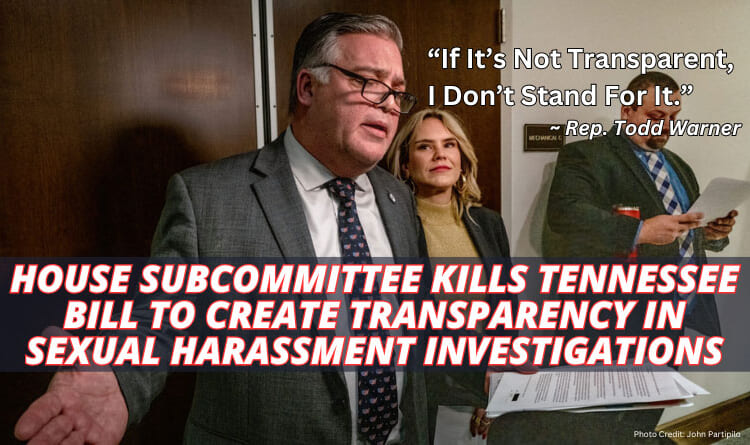Former Rep. Scotty Campbell denied chance to testify; lawsuit dismissed by Circuit Court judge.
Photo: Rep. Todd Warner, R-Chapel Hill, Rep. Aftyn Behn, D-Nashville, and former Rep. Scotty Campbell address the media after a bipartisan bill to create transparency around legislative sexual harassment investigations died in committee without debate. Photo Credit: John Partipilo
By Sam Stockard [Tennessee Lookout -CC BY-NC-ND 4.0] –
A House panel refused Tuesday to hear a bill by a bipartisan duo of lawmakers to shift House sexual harassment investigations to a third party, denying former Rep. Scotty Campbell a chance to testify for the measure.
Campbell, who left the Legislature last year after a group of House lawmakers determined he violated its workplace discrimination and harassment policy, also recently saw his public records lawsuit against the state denied in Davidson County Circuit Court. His attorney, Tony Duncan, confirmed Tuesday he will appeal the case in an ongoing effort to clear Campbell’s name.
Moments earlier, the Public Service Subcommittee chaired by Republican Rep. Iris Rudder failed to muster enough support to consider legislation by Republican Rep. Todd Warner and Democratic Rep. Aftyn Behn, which would move sexual harassment complaints from the Office of Legislative Administration to a new liaison and the state Attorney General’s Office.
Before their bill was denied, Warner was prepared to read a statement by a woman who signed a sworn statement saying she was sexually assaulted while working in the Legislature.
“The sexual harassment policy is a tool to sweep the wrongdoings of those in power under the rug, and by doing this, it is empowering perpetrators to act again,” the woman’s statement says.
Warner said he was “embarrassed” to read it in front of the media and taxpayers, but he was clearly upset about failing to receive a motion and a second to introduce their bill.
The Chapel Hill Republican said he tried to garner backing for the bill on the House floor Monday night but was told by colleagues they wouldn’t support it because Behn, an East Nashville Democrat, signed on as co-sponsor and because Campbell was set to testify for it.
“That ain’t transparency,” Warner said. “If it’s not transparent, I don’t stand for it.”
Their bill stemmed, in part, from Campbell’s sudden departure last year.
The former Mountain City Republican lawmaker contends he was denied due process and noted the bipartisan panel that found he violated the harassment policy only recommended “corrective action,” not resignation or expulsion.
Campbell released a statement reiterating what his lawsuit said, “it appears that I was forced to resign my seat in the House by another member of the body to protect his political career and reputation; he simply could not afford to have an investigative reporter asking questions about any alleged sexual harassment in the House because it might lead that reporter to that member.”
In his lawsuit, Campbell said House Republican Caucus Chairman Jeremy Faison ordered him to leave the Legislature on the final day of the General Assembly session.
Documents in a separate public records lawsuit filed by Brian Manookian over the Campbell case show the state turned in two pages of notes dealing with a victim complaint against Faison. House Speaker Cameron Sexton has said no complaint was filed against Faison, and he has declined comment.
The Warner-Behn bill would have created a liaison position between the House and Senate and the Attorney General’s Office to handle sexual harassment complaints and investigate them, removing politics from the equation.
Warner and Behn said they wanted to make sure they protected victims and gave the accused due process, while making sure records were open to the public, including those detailing any expenses related to cases.
The state reportedly spent $900 moving the intern who was allegedly harassed by Campbell last year but has refused to release the records.
Campbell maintains he had text messages between himself and the intern that would prove he didn’t sexually harass her. He claims Connie Ridley, director of Legislative Administration, refused to look at them.
Separately, Campbell’s attorney, Duncan, said Tuesday the Circuit Court judge ruled that the lawsuits by Campbell and Manookian were basically the same and since Manookian’s lawsuit was filed first, he dismissed the Campbell complaint.
“Respectfully, that’s wrong, and we plan on taking that up on appeal,” Duncan told the Lookout.

About the Author: Sam Stockard is a veteran Tennessee reporter and editor, having written for the Daily News Journal in Murfreesboro, where he served as lead editor when the paper won an award for being the state’s best Sunday newspaper two years in a row. He has led the Capitol Hill bureau for The Daily Memphian. His awards include Best Single Editorial from the Tennessee Press Association. Follow Stockard on Twitter @StockardSam














